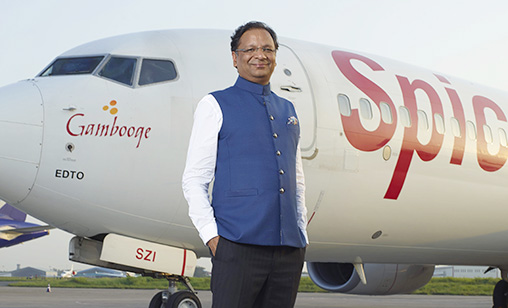News Backgrounder
SpiceJet’s foray into air cargo paying off
India’s second largest private airline, SpiceJet, is transforming into an airport transport group, reports Anjuli Bhargava.
November 1st 2020
After this year’s COVID-19 induced lockdown crippled global aviation and brought passenger traffic to a near halt, Indian airlines, like every airline in the world, were confronted with a bleak future. Read More »
As the shock of the pandemic began to sink in across India, the country’s carriers, led by SpiceJet, homed in on cargo to add cash to their bottom lines. Fellow LCC, IndiGo, quickly followed suit as did several smaller carriers.
 |
Almost all Indian airlines also started doing Vande Bharat transport and charter flights to bring in much needed cash. Vande Bharat, or Train 18, is a high speed electric train, developed and built in India and launched last year. The fleet is planned to expand to 44 trains in the next two years.
Many airlines in India used their existing fleets to transport cargo, but SpiceJet decided to wet lease two aircraft. It is now flying 13 cargo planes and is planning to add three more to its fleet, a gambit many in the industry feel is rash since wet leasing aircraft is expensive and not usually the best option for an airline.
SpiceJet said the cargo push has paid off with revenues from air freight up 144% in the first quarter of 2020 over the same months last year, with its two-year-old cargo wing, SpiceXpress, proving critical to the company’s expanding air freight operations.
“We did not start dedicated cargo operations like some carriers following the lockdown,” said a SpiceJet spokesman, “because the airline already had a dedicated cargo arm. SpiceXpress has taken more than two years of hard work for it to be where it is today.”
Its airline management had “lots of doubts, apprehensions and questions” about the viability of cargo operations when the air freight carrier was launched. “However, for SpiceJet this was a natural progression and a no-brainer because a country as big as ours needed a big cargo operator,” said the spokesman. “The air freight operator has allowed the group to develop the capability and experience to provide door-to-door deliveries to more than 12,500 post codes across India.”
The SpiceJet subsidiary has invested in a logistics chain that has included setting up warehouses. “A lot of things we carry, like blood samples, need a temperature controlled environment. Now we have that facility in our planes and in our ground support vehicles. It is only recently the national focus has shifted to cargo flights, but the group said they were looking at increasing revenue from cargo before the pandemic,” said an airline official.
SpiceXpress aside, which also operates a drone division, the parent carrier intends to move beyond “pure aviation”. “We are relooking at our entire business with a critical lens and diversifying our revenue sources”, said SpiceJet chairman and managing director, Ajay Singh, who has been aggressive in pursuing initiatives during the pandemic.
In due course, the verticals will be independent revenue generating businesses, he has predicted. The group’s businesses range from SpiceTechnic (defence), SpiceCare (air ambulance) and SpiceJet Merchandise (E-commerce, retail & merchandise) to SpiceStar Academy (aviation training).
Recently, following final clearance from UK regulators, SpiceJet announced it would launch three times a week Delhi and Mumbai services to London in the northern winter with wet-leased aircraft, a decision many in Indian aviation describe as “suicidal”.
Singh has defended his decision and said a dedicated team at the airline had been working on launching long-haul operations for close to two years. On multiple occasions, SpiceJet had applied for landing slots without success at Heathrow and other airports in the UK. The slots allotted to SpiceJet became available from September 1, 2020.
“There was no rush from our side. We took our time. The decision to launch operations in December was based on thorough analysis. We have chosen a time when we think demand will be the strongest,” the SpiceJet spokesman said. Watch this space to see how SpiceJet’s latest gamble fares.